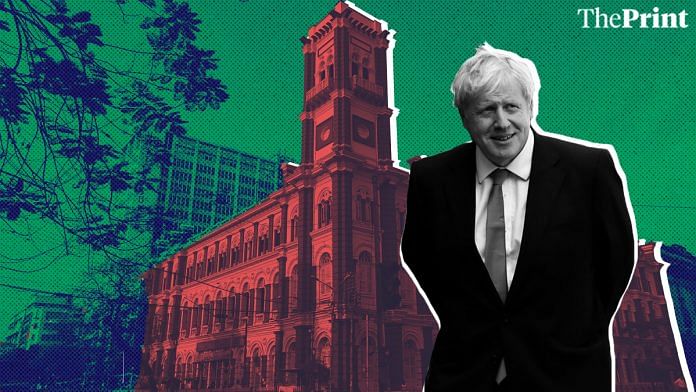New Delhi: The United Kingdom is all set to vote on 12 December after the Parliament supported Prime Minister Boris Johnson’s call for an election after months of Brexit deadlock. This will be the first time in almost a century that Britain will hold an election in December.
Holding early general elections is an attempt by Johnson to win a fresh mandate for his Brexit deal and resolve the deadlock. However, the snap polls could prove to be a tight election although the opinion polls have given the Conservative Party an average lead of ten points.
The Labour Party also has reasons to worry as its leader Jeremy Corbyn’s popularity has taken a hit.
UK’s leading elections expert John Curtice told LBC radio, “Bear in mind, this is not an election that Labour will have to win to stop Brexit, but it is an election that they and the other opposition parties simply need to deny the Conservatives a majority”.
The elections come at a time when campaigning will be difficult due to the cold and voters will be reluctant to attend rallies or perhaps even vote. It will be held under the shadow of Brexit and also when Britain’s economy is going through a rough patch as the Euro has fallen more than 3 per cent so far and Bloomberg predicts “it will slide as much again to $1.07 by the end of 2019”.
The uncertainty around Brexit has also led to an increase in job losses as companies put hiring plans on hold. The number of companies “going bust” has “jumped 35% on the previous quarter to the highest level since 2013″.
In a House of 650 MPs, there are 288 MPs from the Conservative Party, 244 MPs from the Labour Party, 35 MPs from the Scottish National Party (SNP), 19 MPs from the Liberal Democrats and 10 from the Democratic Unionist Party (DUP).
The Print takes a look at the main political parties in the fray, their position on Brexit and the major election issues they have raised.
Conservative Party
Johnson’s Conservative Party wants to leave the European Union with a deal, but he has also proposed an exit without a deal.
Originally, Johnson had proposed 12 December as the election date “which would have allowed a few more days for MPs to debate his withdrawal agreement bill”.
The date proposed by other parties was 9 December to which the party’s Jacob Rees-Mogg said that the “date was not realistic as 25 working days were needed between the dissolution of parliament and polling day”.
A Downing Street spokesperson said: “9 December is a Monday, meaning election preparations would take place during the preceding weekend, which would be logistically difficult and costly”.
Apart from Brexit, the party “won’t wait to deliver” on the “things that haven’t been given attention” like the National Health Services and combating crime.
Labour Party
The Labour Party is open to “renegotiating” the Brexit deal and putting it to public vote again. It says, “Its referendum would be a choice between a ‘credible’ Leave option versus Remain.”
If it chooses to leave, the party will negotiate for the UK to remain in the European Union and “retain close single market relationships”.
Apart from Brexit, lowering the voting age to 16 remains Labour Party’s key campaign. Party MP Richard Burgon even said that they would be pushing to allow EU citizens and 16 and 17-year-olds to vote in the election.
Liberal Democrats
Maintaining a soft Brexit stance, the Liberal Party, led by Jo Swinson, have “pledged to cancel Brexit if they win power at the next general election”.
The party remains interested in pre-Christmas elections as they were “doing well in the polls on the back of their pro-EU position”.
Scottish National Party
Scottish National Party leader Nicola Sturgeon maintains that it wants the UK to stay as a part of the EU and is ‘pro-remain’.
Sturgeon had tweeted that the “Brexit chaos is being imposed on Scotland against our will”. She said that Scotland’s independence referendum will be at the heart of the party’s election campaign.
The party was keen on the elections as it “expected to gain MPs in Scotland on current predictions”.
The SNP maintained that the government’s proposed date was “calculated to prevent Johnson bringing his Brexit deal back to Parliament”.
Democratic Unionist Party
While the DUP, led by Arlene Foster, supports Brexit, it is “worried that the union between Northern Ireland and the rest of the UK could be threatened because Northern Ireland would have to stick to some EU rules”.
With parties in Northern Ireland split on Brexit, it will be the key campaign issue for the December elections.
Brexit Party
The Brexit Party, which led the original leave EU campaign, is led by Nigel Farage. It stands for “clean-break Brexit” wherein it wants to leave the EU without a deal. The party claims that Johnson’s revised Brexit plan “is a bad deal because it would still involve paying the EU a £39bn settlement”.
Also read: Boris Johnson manages to get nod for Brexit bill, but not for sticking to deadline



